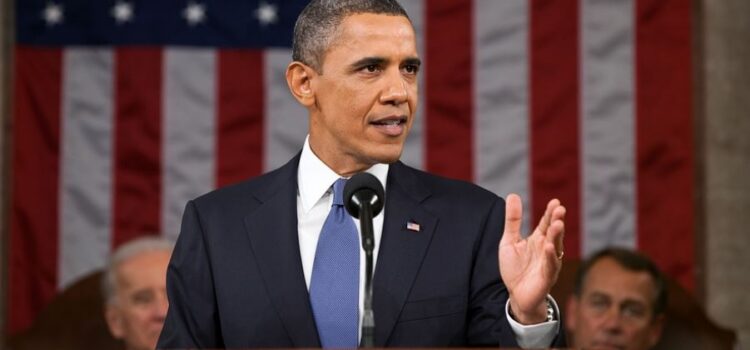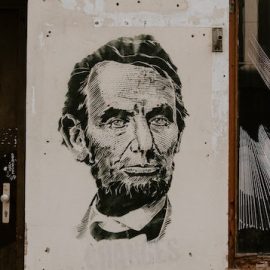

This article is an excerpt from the Shortform book guide to "A Promised Land" by Barack Obama. Shortform has the world's best summaries and analyses of books you should be reading.
Like this article? Sign up for a free trial here .
What was Barack Obama’s past political experience? When did he first run for office?
Barack Obama’s past political experience began when he ran for the Illinois State Senate. His time in the state senate taught him valuable political lessons.
Read more about Barack Obama’s past political experience in the Illinois State Senate.
Barack Obama’s Early Political Experience
Barack and Michelle were married in 1992 at Trinity United Church of Christ, with the service officiated by the Reverend Jeremiah Wright Jr.—a figure who would later play a significant role in Barack’s political career.
After marrying Michelle and settling in the Hyde Park neighborhood of Chicago, Barack chose to forego several high-paying opportunities to work at high-powered law firms in the city. He was instead drawn to public service, to the idea of working for social justice and political empowerment. He took up a teaching position at the University of Chicago School of Law and worked for a small civil rights-focused law firm (mostly dealing with employment discrimination cases).
During the 1992 election cycle, Barack successfully ran Project VOTE!, the largest voter-registration drive in the history of Illinois up to that time. In this role, he had the opportunity to build on the lessons he’d learned as a community organizer—while making some early political connections across the state.
In 1995, a new opportunity opened up that would set Barack on the path that would define the rest of his and Michelle’s lives. That fall, his district’s seat in the Illinois State Senate became available when the incumbent, Alice Palmer, announced that she would be leaving to run for the U.S. House of Representatives.
Before long, local political leaders—including Palmer herself—were encouraging Barack to run for the state senate seat. When Barack first presented the idea to Michelle, she was skeptical. Did they really want to get involved in the notoriously hardball world of Chicago politics? Did Barack really want to spend time away from Michelle in the state capital in Springfield? But Barack Obama, past political experiences encouraged him to follow this path.
Despite her reservations, however, Michelle recognized that this was something Barack needed to do. With some reluctance, she gave the idea her blessing. Barack would make the race.
Learning Hardball Politics
But if Barack thought his campaign for state Senate would be marked by high-minded rhetoric and wonkish position papers, he was to be sorely mistaken. Barack Obama’s past political experience hadn’t prepared him for this.
Grizzled Chicago campaign veterans Ron David and Carol Anne Harwell bluntly advised him to knock off the “League of Women Voters shit.” This wasn’t a debate at Harvard Law; it was a street-level brawl for the state Senate, where the Chicago political machine would be doing everything it could to keep an outsider like Barack Obama off the ballot.
More than anything else, he needed to collect valid signatures from Democratic voters in the district to get his name on the primary ballot—in fact, he’d need many times more signatures than the legal requirement, because the Democratic establishment would comb through every one of his signatures trying to disqualify his nominating petitions.
During this campaign, Obama was far from being the oratorical master he’d later become. His early speeches were stilted, wooden, and overly reliant on facts and figures. But he got better and learned how to make a more deep, resonant, and emotional connection with voters as he spoke to groups throughout the district and articulated his vision for why he was their best choice to represent them in Springfield.
Learning to Fight Back
During this first campaign, Obama learned that he had to fight and win political battles in order to make the change he wanted to see. or Barack Obama, past political experience would teach him how to have hope.
Alice Palmer shocked him when she decided to reenter the primary race for the state Senate seat after she’d failed in her bid for the U.S. House. Obama felt betrayed—Palmer had endorsed him and all but anointed him as her successor in Springfield. Now, she was double-crossing him because she wanted to maintain her own political power.
Barack was conflicted about what to do. His campaign managers advised him to aggressively challenge Palmer’s own nominating petitions, which they suspected were filled with invalid signatures—from non-registered voters, non-Democrats, and people who lived outside the district.
Still, he felt that trying to knock Palmer off the ballot would be embracing the very kind of dirty, hardball politics that he found so distasteful. But his campaign managers quickly cured him of his naivete. Palmer had betrayed him, lied to his face. He shouldn’t be resigned and timid, they argued; he should be angry and fired up. And he wouldn’t be able to make any difference in the state capital if he lost the race.
In the end, Barack agreed. His campaign aggressively challenged Palmer’s petitions, which, sure enough, turned out to be filled top-to-bottom with invalid signatures. Palmer was knocked off the ballot, leaving Barack to run unopposed in the March 1996 Democratic primary. In the overwhelmingly Democratic district, this was tantamount to election. In the November 1996 general election, Barack defeated the token Republican opposition and won with an overwhelming majority of the vote. He had won his first public office and was headed to Springfield. For Barack Obama, past political experience was only the beginning.

———End of Preview———
Like what you just read? Read the rest of the world's best book summary and analysis of Barack Obama's "A Promised Land" at Shortform .
Here's what you'll find in our full A Promised Land summary :
- How Barack Obama went from relative obscurity to the first Black president
- What principles guided his political leadership style
- Why Obama retained an unshakable faith in the potential and promise of America






